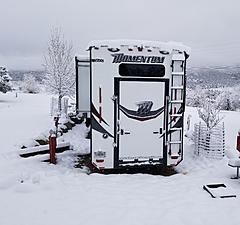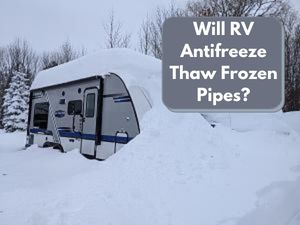So you got delayed on winterizing your RV or maybe a deep freeze snuck up on you and froze your RV pipes. At this point you’re wondering: will RV antifreeze thaw frozen pipes? No, RV antifreeze will not melt ice in pipes.
RV antifreeze is designed to prevent pipes from freezing, but can’t thaw frozen pipes once freezing occurs.
Fortunately, there are other ways you can thaw frozen RV pipes and keep RV pipes from freezing which we cover in other guides, but here we will go over a little more about RV antifreeze so you can get a full understanding of its uses and limitations.
Does RV Antifreeze Thaw Frozen Pipes?
So will pouring RV antifreeze thaw a frozen pipe?
Simply put, the chemical makeup of RV antifreeze doesn’t make it able to melt ice or thaw frozen pipes.
If you pour RV antifreeze into your pipes hoping to thaw them, it’ll just sit on top of the ice, making a bigger mess, so trust us and don’t attempt it.
The purpose of RV antifreeze is to prevent expansion from occurring during sub-freezing temperatures by lowering the freezing point.
Additionally, there are some types of RV antifreeze that act as a lubricant to protect the seals inside your toilet and faucets as an added bonus.
In the event you are facing an RV one night freeze, you don’t need to worry about your pipes freezing in general, so you can breathe a sigh of relief here.
What Is RV Antifreeze?
RV antifreeze is a type of antifreeze that’s meant to be non-toxic for use in RV plumbing systems.
There are two basic kinds of RV antifreeze: ethanol and propylene glycol, both of which are different types of alcohol that makes water able to withstand lower temperatures before freezing.
Ethanol RV Antifreeze Vs Propylene Glycol RV Antifreeze
Although ethanol antifreeze is often cheaper, many RVers have reported that it can leave a bad taste in the plumbing system after you get your rig running once the cold weather’s gone, which is no good.
Also, ethanol-based RV antifreeze can corrode rubber plumbing seals and is also flammable, which is another concern.
Propylene glycol RV antifreeze also has a lower freezing point, which will cover further in depth below.
For these reasons, we recommend RV antifreeze that’s propylene glycol-based.
No products found.
RV Antifreeze Vs Automotive Antifreeze
Some folks ask: can I use regular antifreeze in my RV?
The answer is: absolutely NOT. Automotive antifreeze is toxic and should only be used in an engine cooling system.
Furthermore, the antifreeze used in your RV engine may have different properties than the antifreeze you use in your car, so be sure to use the right one in each to avoid damage.
What’s The Freezing Point Of RV Antifreeze?

RV antifreeze is made of propylene glycol which will not fully freeze, but it will get slushy.
RV antifreeze is available in minus 50 degrees F, minus 75 degrees F, and minus 100 degrees F.
Antifreeze rated at -50 F has a freeze point of +12 degrees F, so at or below +12 F it will start to get slushy.
-50 F antifreeze has a freeze burst point of -50 F, so that’s not a worry since you’ll never see temperatures that low.
You don’t have to even worry about -75 F or -100 F antifreeze getting slushy because their freeze points go to -20F or -60 F respectively, and their burst freeze points are -75 F and -100 F.
Most RV antifreeze with a -100 F rating is the propylene glycol variety.
Note that diluting your RV’s antifreeze with water will raise the freezing temperature, making it easier to freeze at higher temps.
What Color Is RV Antifreeze?
Pink RV antifreeze is typically the antifreeze rated at -50F and -75F.
Blue or purple RV antifreeze is usually the type rated at -100F.
What Does GRAS Mean On RV Antifreeze?
GRAS stands for Generally Regarded As Safe, which is an FDA term to look for on antifreeze products identifying them as non-harmful if swallowed, which makes them safe for RV indoor plumbing and potable water sources.
Note that you should still avoid ingestion of it!
Wrapping Things Up
We hope this guide helped to answer your question on whether or not rv antifreeze thaws frozen pipes.
Let us know if you have any other questions in the comments section below.
While you’re here, check out our other helpful RV repair guides:
- What to do if your RV water pump keeps running
- How to perform RV toilet foot pedal repair
- Our guide to RV roof reseal cost
- What to do if your RV heater is blowing cold air
- How to fix an RV microwave not working
- Our guide to motorhome fuel pump replacement
- How to replace RV window glazing bead
- How to fix an RV toilet not holding water
- How to fix a sagging RV slide out
- How to locate, operate, and repair your RV low point drain valve.

